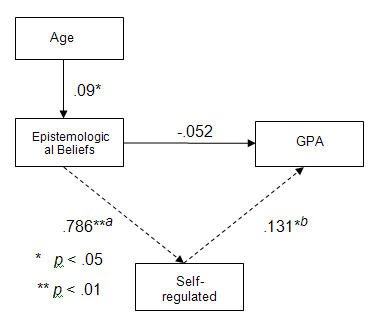Discussion
The
results of the current study suggest a significant
relationship between the epistemological beliefs and
the self-regulated learning skills of online
learners. This finding supports current theoretical
understanding of epistemological beliefs and
self-regulated learning skills as being related with
there being a statistically significant relationship
between as being two meta-cognitive constructs of
epistemological beliefs and self-regulated learning
skills (Ormrod, 2008). By employing structural
equation modeling techniques, the impact of the
relationship between epistemological beliefs and
self-regulated learning skills on academic
achievement among online learners was examined as a
whole. The results of this study indicate that
self-regulated learning skills in the online
learning environment may be viewed as mediating the
relationship between epistemological beliefs and
academic achievement as measured by GPA.
As
in the results of Bell (2006), the relationship
between epistemological beliefs and academic
achievement in the current study was small and
non-significant. Self-regulated learning skills
appeared to mediate this small, non-significant
relationship between epistemological beliefs and
academic achievement with an estimated indirect
effect larger than the direct effect between
epistemological beliefs and academic achievement.
This larger indirect effect indicates that
self-regulated learning skills may function as a
suppressor variable rather than a mediating
variable. Suppressor variables have been noted as
being difficult to interpret as these variables
enhance the relationship between desired independent
and dependent variables by their presence given
their correlation with other variables (Tabachinck &
Fidell, 2007). The researchers suggest that the
strong, positive, and significant association
between epistemological beliefs and self-regulated
learning skills would enhance the relationship
between epistemological beliefs and academic
achievement when self-regulated learning skills are
inserted into the model. The researchers conclude
that epistemological beliefs are associated with
academic achievement only through the suppressor
variable of self-regulated learning skills.
This finding is especially relevant to provide
instruction and interventions to online learners.
For online instruction, educators must be concerned
with the development of epistemological beliefs in
relation to self-regulated learning skills as being
associated with academic achievement in tandem and
not simply separately. As such, Winne (1995) as
cited in Hofer and Pintrich (2002) has theorized
that, “epistemological beliefs serve an important
role of setting standards for students’
self-regulated learning,” (p. 106). The combination
of these two meta-cognitive constructs appears to
play an important role on the academic achievement
of online learners. Future research should consider
the interaction of epistemological beliefs and
self-regulated learning skills as being associated
with academic achievement rather than in isolation
of one another. The researchers also suggest the
examination of self-regulated learning skills as
possibly a complete mediator (rather than suggested
suppressor variable as found in the current study),
where self-regulated learning skills function as a
light switch to the connection between
epistemological beliefs and academic achievement.
The researchers furthermore suggest examining the
development of epistemological beliefs and
self-regulated learning skills longitudinally and in
relation to one another across time.
Several limitations emerged as part of the current
study. For instance, the relationship between
self-regulated learning skills in the online
learning environment and academic achievement were
not as strongly related as the researchers would
have expected with a standardized path coefficient
of .131. This small, positive but significant
association between self-regulated learning skills
and academic achievement may be explained by how the
variable of academic achievement was operationalized.
For the purposes of this study, we obtained
cumulative grade point averages, which would include
grades from coursework delivered online and in a
traditional face-to-face course format. In this
case, cumulative grade point average would reflect
academic achievement achieved in both online and
traditional coursework.
Conclusions
Previous research has indicated a possible
relationship between student perceptions in the
online learning environment and their subsequent
self-regulatory learning skills (Barnard, Paton, &
Rose, 2007). Indeed, Barnard, Paton, and Lan (2008)
found that online self-regulatory learning skills
behaved as a mediator in the relationship between
student perceptions of the online course environment
and academic achievement. The results of the current
study extend this line of research to examining
whether these self-regulatory learning skills in the
online learning environment may function as a
mediator in the relationship between epistemological
beliefs and academic achievement. In complementing
previous research, our results indicated that these
self-regulatory learning skills in the online
learning environment may be viewed as mediating this
relationship.
References
Barnard, L., Paton, V. O., & Lan, W. Y. (2008).
Online self-regulatory learning behaviors as a
mediator in the relationship between online course
perceptions with achievement. International
Review of Research in Open and Distance Learning,
9(2), 1-11.
Barnard, L., Paton, V. O., & Rose, K. (2007).
Perceptions of online course communications and
collaboration. Online Journal of Distance
Learning Administration, 10(4). Available
online from:
Hhttp://www.westga.edu/~distance/ojdla/winter104/barnard104.html
Bell, P. D. (2006). Can Factors Related to
Self-regulated Learning and Epistemological Beliefs
Predict Learning Achievement in Undergraduate
Asynchronous Web-based Courses? Perspectives in
Health Information Management, 3(7), 1-17.
Browne, M. W. & Cudek, R. (1993). Alternative ways of assessing models
fit. In K. A. Bollen & J. S. Long (Eds.), Testing
structural equation models.
Newbury Park, CA: SAGE.Sage.
Enders, C. K., & Bandalos, D. L. (2001).
The
relative performance of full information maximum
likelihood estimation for missing data in structural
equation models. Structural Equation Modeling: A
Multidisciplinary Journal, 8, 430-457.
Fisher, M. & Baird, D. E. (2005). Online learning
design that fosters student support,
self-regulation, and retention. Campus-wide
Information Systems, 22(2), 88-107.
Hofer, B. K. (2004). Exploring the dimensions of
personal epistemology in differing classroom
contexts: Student interpretations during the first
year of college. Contemporary Educational
Psychology, 29(2), 129-163.
Hofer, B. K. (2001).
Personal epistemology research: Implications for learning and
teaching. Educational Psychology Review, 13,
353-382.
Hofer, B. K. & Pintrich, P. R. (2002). Personal epistemology: The
psychology of beliefs about knowledge and knowing.
Mahwah,
New Jersey:
Lawrence Erlbaum Associates.
Hu, L. & Bentler, P. M. (1999). Cutoff criteria for fit indices in
covariance structure analysis: Conventional criteria
versus new alternatives. Structural Equation
Modeling, 6, 1-55.
Lan, W. Y., Bremer, R., Stevens, T., & Mullen, G. (2004, April). Self-regulated
learning in the online environment. Paper
presented at the annual meeting American Educational
Research Association,
San
Diego, California.
Muthén, L. K. & Muthén, B. O. (2007). MPlus User’s Guide.
Los
Angeles, CA: Muthén & Muthén.
Nota, L., Soresi, S., & Zimmerman, B. J. (2004).
Self-regulation and academic achievement and
resilience: A longitudinal study.
HInternational
Journal of Educational ResearchH,H
41(3H), 198-215.
Ormrod, J. E. (2008). Educational psychology: Developing learners
(6th edition).
Upper Saddle River, New Jersey: Pearson.
Pieschl, S., Stahl, E., & Bromme, R. (2007).
Epistemological beliefs and self-regulated learning
with hypertext.
Metacognition Learning, 3, 17-37.
Schraw, G., Bendixen, L. D., & Dunkle, M. E. (2002). Development and
validation of the Epistemic Belief Inventory (EBI).
In B.K. Hofer and P.R. Pintrich (Eds.), Personal
epistemology: The psychology of beliefs about
knowledge and knowing.
Mahwah, NJ: Lawrence Erlbaum Associates Publishers.
Schunk, D. H. & Zimmerman, B. J. (1998). Self-regulated learning: From
teaching to self-reflective practice.
New
York: London.
Tabachnick, B. G., & Fidell, L. S. (2007). Using Multivariate
Statistics (5th ed.). Boston:
Allyn and Bacon.
Tsai, C. C. & Chuang, S. C. (2005). The correlation between
epistemological beliefs and preferences toward
Internet-based learning environments. British
Journal of Educational Technology, 36(1),
97-100.
Winne, P. H. (1995). Inherent details in self-regulated learning.
Educational Psychologist, 30, 173-187.
Zimmerman, B. J. & Schunk, D. H. (2001). Self-regulated learning and
academic achievement: Theoretical perspectives (2nd
edition).
Mahwah, NJ: Lawrence Erlbaum Associates.
|

